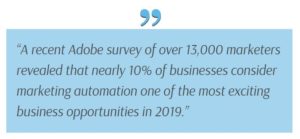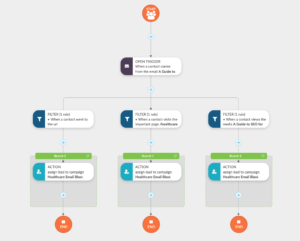Managing large email lists and organizing content flow can be a monumental task for organizations of any size, but particularly for large manufacturing companies. For this reason, many companies are turning to marketing automation tools to assist with lead capture, lead nurturing and customer relationship management.
A recent Adobe survey of over 13,000 marketers revealed that nearly 10% of businesses consider marketing automation one of the most exciting business opportunities in 2019. More than 20% of respondents listed implementing marketing automation to help streamline time-consuming tasks as one of their top priorities for 2019.
In this post, we’ll review how Ashworth Creative can use email software and content automation tools, to help manufacturing marketers by streamlining and automating every step of the buying funnel.
The power of email
Email marketing is one of the most effective ways B2B companies reach out to prospects and clients. HubSpot reports that more than 90% of B2B marketers use email to distribute content and 40% say email newsletters are critical to their content marketing success.
Engagement tends to be stronger for B2B emails versus B2C with higher desktop open and clickthrough rates (though mobile clickthrough rates trend lower for B2B.) Using a tool to create and manage email is important for all companies, but mid-to-large-sized companies can quickly outgrow lower end tools such as MailChimp. A solution to this is to engage a more enterprise-focused tool like SharpSpring. Ashworth Creative is a SharpSpring Silver Certified Agency Partner.
In the interest of practicing what we preach, we’ve recently implemented SharpSpring, a CRM and content automation tool, to manage our own email marketing campaigns. Among other things, SharpSpring allows us to manage content and automate email campaigns in a flexible and scalable way.
Going beyond email tools
Standalone email platforms like MailChimp have limited email segmentation features and don’t offer the kind of flexibility of a more robust tool like SharpSpring.
Our CEO and SharpSpring expert, Eve Ashworth explains. “MailChimp is focused on email only, although they have some rudimentary automation features,” says Eve.
“Marketing automation software is not just about sending email. For example, SharpSpring can also build landing pages, integrate content into emails and schedule different types of content to be published (e.g., emails, blog posts, social media posts, etc.)”
“Another valuable feature of SharpSpring,” explains Eve, “is that it allows you to build visual workflows which require setting rules based on specific triggers (e.g., you can send an email in response to what a user clicks on or interacts with.)”
Workflows help companies organize content intelligently and schedule certain actions to occur automatically based on user response.
“SharpSpring tracks all of this,” Eve says. “Once we have a prospect’s contact information, the workflow feature helps us automate lead tracking and nurturing.”
90% of B2B buyers say that online content has a moderate to major impact on their purchasing decision, so it’s important for marketers to deliver the right content to prospects in a timely way. This is where marketing automation tools such as SharpSpring really shine.
The key benefits of marketing automation for manufacturing companies
One of the main goals of marketing automation is to increase revenue and sales. Since nearly 70% of the B2B buyer’s journey is performed digitally, automation tools can help deliver relevant ongoing information with the goal of increasing sales.
Key benefits include the following:
- Increased lead generation—Automation tools like SharpSpring help companies qualify leads based on their position in the sales cycle and customize content accordingly. “Manufacturing companies tend to be large and reach a broad audience of people without knowing exactly who they are and where they are in the sales cycle,” says Eve. “SharpSpring scores leads so you can see who is interacting with and opening emails. It’s a way to begin nurturing leads and following them through the sales funnel.”
- Improved sales—Features like lead scoring and segmentation help companies gain valuable insights on prospect interests and attributes. You can then send targeted messages to specific leads and even personalize your email or web content Automatically. “The lead nurturing feature is really powerful with SharpSpring,” Eve explains, “You can create drip campaigns and move people to new campaigns based on how they react to content (or not).”
- Tracking and reporting— SharpSpring has tracking reporting tools baked into its platform. Marketers can record deals and gain insight into their audience through detailed analytics. This helps companies eliminate wasteful spending on ineffective campaigns and establish ROI for all initiatives to better inform planning and decision making.
- Increased revenue— As we stated above, the main goal of implementing a marketing automation tool is to increase revenue. SharpSpring helps manufacturing marketers better understand how prospects interact with content and it also organizes content so that it will be delivered to the right prospect at the right time, helping facilitate the sale. In B2B marketing, nearly 70% of customers are lost due to perceived vendor indifference or apathy. Nurturing leads by delivering relevant, timely content is one way to help curtail this dismaying statistic. Additionally, nurtured leads spend more, with studies showing that purchases from nurtured leads are 47% larger than non-nurtured leads.
The bottom line
With email more than twice as likely to yield a positive return on investment than cold calling, implementing comprehensive email and content marketing strategies is no longer optional for manufacturing companies.
B2B buyers have come to expect more content and outreach from sales teams when they’re researching a product or service. A recent DemandGen survey of B2B buyers revealed that 76% of respondents want content that speaks directly to their company.
These are buyers that are starting the buying journey online and spending more time researching purchases. Implementing a marketing automation tool is a great (and necessary) way that manufacturing companies can meet these expectations in a way that’s cost effective and scalable. Ashworth Creative can help setup, manage and build content for all CRM’s including SharpSpring, Hubspot, Infusionsoft, Salesforce, Claritysoft, Freshsales, Pipeline, Insightly and Zoho.




There are indeed many reasons why B2B manufacturing companies need an automated marketing. It’s good that you’ve mentioned some of the key benefits. These benefits will surely help those who are still in doubt to start automated marketing for their companies. Keep posting!